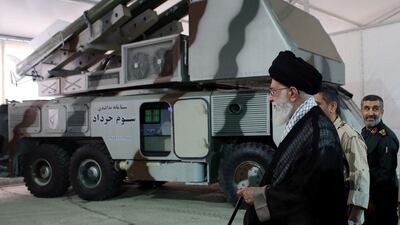The deepening crisis in the Gulf over allegations that Iran was responsible for recent attacks on a number of oil tankers raises fresh questions about the insistence of major European powers on retaining their commitment to the 2015 nuclear deal.
One of the main arguments that the Trump administration used to justify its decision to withdraw from the nuclear deal in May last year was Iran’s continued sponsorship of terrorist groups such as Hezbollah, as well as its support for the Houthis in Yemen and the Assad regime in Syria. From Washington’s standpoint, Tehran’s actions were not thought to be in keeping with the spirit of the nuclear deal, which the previous Obama administration had hoped would result in Iran adopting a more constructive approach in its dealings with the outside world.
The White House also had serious misgivings about the contents of the deal itself, with US President Donald Trump describing it as the "worst ever" because of its narrow focus on Iran's nuclear enrichment, omitting other critical elements of an armament programme, including ballistic missiles.
Washington’s decision to withdraw from the agreement has hit the Iranian economy hard, and US intelligence officials believe the recent attacks on shipping in the Gulf, as well as a missile attack on the US embassy in Baghdad, are Iran’s way of responding to the pressure the regime is under at home.
But while Iran might find itself accused of committing serious violations of international law, if allegations that it was responsible for these hostile acts prove true, the major European powers that were involved in helping to negotiate the deal – Britain, France and Germany – appear resolutely determined to uphold it, irrespective of any provocative acts the Iranians might undertake.
Indeed, such is their commitment to sticking with the deal that, together with the European Union, they are still attempting to set up their own trading mechanism – the so-called special purpose vehicle – that would enable European businesses to continue trading without running the risk of being subjected to punitive measures by the US.
The European stance is fast becoming a source of friction with American policymakers, who believe that Europe’s continued support for the deal is undermining their efforts to persuade Tehran to return to the negotiating table and agree a better settlement.
But, to judge by comments made this week by Nathalie Tocci, a senior member of the EU’s foreign policy establishment, the Europeans see the US, not Iran, as being responsible for the recent rise in tensions in the Gulf. In an interview with the BBC, Ms Tocci accused Washington of committing a “violation” of the nuclear deal.
Europe’s insistence on sticking with the nuclear deal is, in part, explained by the fact that the negotiations that ultimately led to it were the result of a European initiative spearheaded by the so-called EU3 – Britain, France and Germany – in the middle of the previous decade.
This was at a time when the US-led invasion of Iraq was starting to turn sour, with the political vacuum caused by the overthrow of Iraqi dictator Saddam Hussein being filled by sectarian violence.
European politicians like Jack Straw, the then British foreign secretary who had privately opposed the invasion of Iraq, argued that there were better ways of confronting rogue states than launching military action and set about launching a diplomatic initiative with his French and German counterparts to resolve the long-standing issue concerning Iran’s nuclear activities by peaceful means.
Thus, when the deal was finally agreed in 2015, it was hailed as the EU’s first major feat of international diplomacy, even though it took the belated intervention of former US President Barack Obama to seal the agreement.
And it is for this reason that the EU is determined not to let its cherished diplomatic triumph wither on the vine, no matter how provocative Iran’s actions might be.
The other factor, of course, that helps to explain Europe’s position are the deep-seated feelings of hostility that many European leaders have for Mr Trump, whose administration they fear is more interested in regime change in Tehran than resolving the complex nuclear issue.
Even so, Europe’s insistence on upholding the nuclear deal could ultimately become untenable if Iran goes ahead with its threat to expand its nuclear activity at the same time that it stands accused of conducting a series of unprovoked attacks on international shipping.
If, as looks likely, Iran has embarked on a campaign to disrupt shipping in one of the world’s most important energy arteries, then the most likely response from the US will be to intensify its military presence in the region, with the aim of providing safe passage for vessels passing through the Strait of Hormuz being the main priority.
The last time this happened was towards the end of the Iran-Iraq war in the 1980s, when American and other coalition warships were deployed to escort tankers through the Gulf.
If this policy is repeated, then the pressure will grow on Europe to support the operation, particularly as it is Europe, not the US, that is heavily dependent on the free flow of trade through the Gulf for its energy needs.
Britain, which officially remains committed to the nuclear deal, has already signalled its willingness to support Washington and has deployed warships and marines to the Gulf in support of American operations.
And there are signs that other European countries such as Germany are losing patience with Tehran over its latest antics, with German foreign minister Heiko Maas warning this week that the possibility of conflict in the Gulf could not be ruled out.
Certainly, if Iran continues to inflame tensions in the Gulf, then Europe’s ability to continue defending the deal will no longer be viable.
Con Coughlin is the Telegraph’s defence and foreign affairs editor and author of Khomeini’s Ghost


